陕旅版英语五年级上册Lesson 10 I want to watch Channel 5教学设计
陕旅版五年级英语上册Lesson10IwanttowatchChanel5教案

Lesson 10 I want to watch Chanel 5.第一课时教学目标:1、能听、说、认、读写下列单词及短语:channel、 TV、match、Tv play、turn on、turn off2、能听懂、会说、会用、会写下列句型:(1)May I turn on the TV, please?(2)Certainly , Go a head.(3)Turn to channel 8.教学重、难点:掌握本课所要求的单词、短语及句型。
教学用具:一台模型电视机、各频道纸条。
教学过程:一、复习导入:集体朗读韵文诗“Merry May”二、新授:1、教师出示频道纸条,每个纸条上分别标有:CCTV 1 CCTV 2 CCTV 3CCTV 4 CCTV 5 CCTV 6学生读出这些纸条。
2、新授词汇:(1)告诉学生这些频道可用英语说成:Channe1, Channel 2, Channel 3, Channel 5和Channel 8.(2)出示“看电视”图片,让学生做看电视的动作,教授watch TV可进行如下师生对话。
T:What do you want to do after dinner?S:I want to watch TV.T:What do you want to watch?S:I want to watch Channel 2.(3)老师拿出模型电视,做开、关电视的动作,重复turn on 、 turn off,让学生试着说:turn on the TV, turn off the TV.(4)教师出示图片、教授TV play , football match3、看课本第46页,回答下列问题?(1)Where are they?(2)Who are they?(3)What are they doing?4、教师放录音、让学生听录音后,回答问题,最后跟读课文对话。
1. A:What does Li Dong want to do?B:He wants to turn on the TV.2. A:What does Li Shan want to watch?B:She wants to watch a TV play.3. A:What does Li Dong want to watch?B:He wants to watch Channel 5. He wants to watch a football match.4. A:What do they watch at last?B:Channel 8,the TV play.三、巩固练习:三人分角色进行会话练习。
陕西旅游版英语五年级上册Lesson 10 I want to watch Channel 5课件

Who are they ?
They are Li Dong , Li Shan and their father .
What are they doing? They are watching TV.
Think Of :
Who wants to watch TV play?
Who wants to watch Channel 5?
PRIMARY SCHOOL ENGLISH STUDENTS’ BOOK 5
Lesson 10
第一课时 一:教学目标(teaching aims) 1 能听,说,认,读,写下列单词及短语: channel, TV, match , TV play , turn on , turn off 2 “四会”词句: (1) May I turn on the TV, please? (2) Certainly . Go ahead. (3) Turn to Channel 8 . (4) I want to watch Channel 5. 二:教学重难点(key points and difficult points.) 掌握本课所要求的单词,短语及句型。
10
I want to watch Channel 5
a match There is a match now .
CCTV 5
football match I’d like to watch the football match .
turn
to
Turn to Channel 8 .
CCTV 8
Home
work:
A: 1.Continue to study the words and sentences . 2.Prepare the text of next class. 3.Do the part two of Exercise Book. B: 1.Do the dialogue with your partner. 2.Recite the text.
陕旅版五年级英语上册知识点汇总
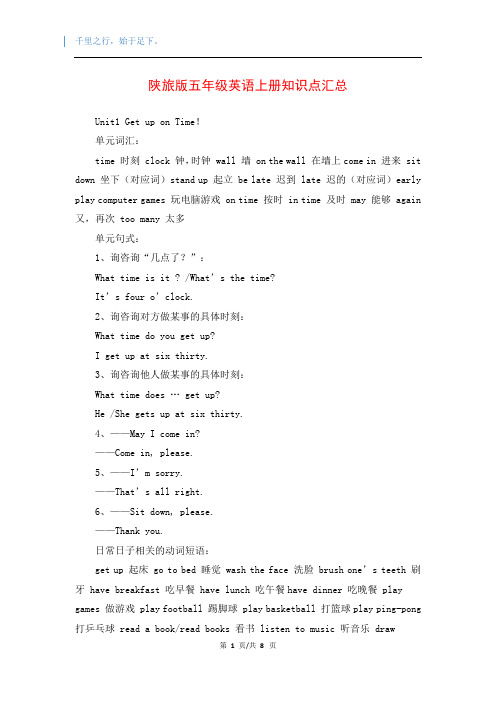
陕旅版五年级英语上册知识点汇总Unit1 Get up on Time!单元词汇:time 时刻 clock 钟,时钟 wall 墙 on the wall 在墙上come in 进来 sit down 坐下(对应词)stand up 起立 be late 迟到 late 迟的(对应词)early play computer games 玩电脑游戏 on time 按时 in time 及时 may 能够 again 又,再次 too many 太多单元句式:1、询咨询“几点了?”:What time is it ? /What’s the t ime?It’s four o’clock.2、询咨询对方做某事的具体时刻:What time do you get up?I get up at six thirty.3、询咨询他人做某事的具体时刻:What time does … get up?He /She gets up at six thirty.4、——May I come in?——Come in, please.5、——I’m sorry.——That’s all right.6、——Sit down, please.——Thank you.日常日子相关的动词短语:get up 起床 go to bed 睡觉 wash the face 洗脸brush one’s teeth 刷牙 have breakfast 吃早餐 have lunch 吃午餐have dinner 吃晚餐 play games 做游戏 play football 踢脚球 play basketball 打篮球play ping-pong 打乒乓球 read a book/read books 看书 listen to music 听音乐 drawpictures /draw a picture画画 fly a kite 放风筝 do exercise 做运动 see a film 看电影 do some washing 洗衣服 do some cooking 做饭do one’s homework 做作业 watch TV 看电视go to school 去上学go home 回家go to work 去上班take photos 拍照片 play the music 播放音乐 sing a song 歌唱 climb the mountain 爬山时刻的相关表达:at eleven o’clock 在11点整 at ten fifty-six 在10:56in the morning 在凌晨 in the afternoon 在下午 in the evening 在晚上 at noon 在中午 at night 在夜里 after class 下课后 after school 放学后拓展:动词第三人称单数的变化规则(和名词变复数规则基本相同)1.普通事情下,直截了当加-s,如:get-gets play-plays like-li kes run-runs jump-jumps dance-dances sing-sings swim-swims2.以s. x. sh. ch. o结尾,加-es,如:guess-guesses, wa sh-washes, watch-watches, go-goes, do-does3.以“辅音字母+y”结尾,变y为i, 再加-es,如:study-st udies4、have-has第三人称单数有he ,she ,it, 人名,your father / mother / grandpa /grandma 等。
陕旅版五年级英语上册知识点汇总
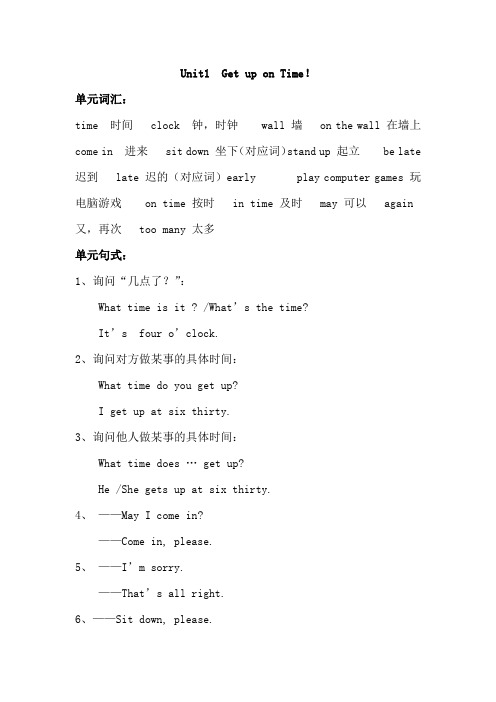
Unit1 Get up on Time!单元词汇:time 时间 clock 钟,时钟 wall 墙 on the wall 在墙上come in 进来 sit down 坐下(对应词)stand up 起立 be late 迟到 late 迟的(对应词)early play computer games 玩电脑游戏 on time 按时 in time 及时 may 可以 again 又,再次 too many 太多单元句式:1、询问“几点了?”:What time is it ? /What’s the time?It’s four o’clock.2、询问对方做某事的具体时间:What time do you get up?I get up at six thirty.3、询问他人做某事的具体时间:What time does … get up?He /She gets up at six thirty.4、——May I come in?——Come in, please.5、——I’m sorry.——That’s all right.6、——Sit down, please.——Thank you.日常生活相关的动词短语:get up 起床 go to bed 睡觉 wash the face 洗脸 brush one’s teeth 刷牙 have breakfast 吃早餐 have lunch 吃午餐have dinner 吃晚餐 play games 做游戏 play football 踢足球 play basketball 打篮球play ping-pong 打乒乓球 read a book/read books 看书 listen to music 听音乐 draw pictures /draw a picture画画 fly a kite 放风筝 do exercise 做运动 see a film 看电影 do some washing 洗衣服 do some cooking 做饭 do one’s homework 做作业 watch TV 看电视go to school 去上学go home 回家go to work 去上班take photos 拍照片 play the music 播放音乐 sing a song 唱歌 climb the mountain 爬山时间的相关表达:at eleven o’clock 在11点整 at ten fifty-six 在10:56in the morning 在早晨 in the afternoon 在下午 in the evening 在晚上 at noon 在中午 at night 在夜里 after class 下课后 after school 放学后拓展:动词第三人称单数的变化规则(和名词变复数规则基本相同)1.一般情况下,直接加-s,如:get-gets play-plays like-li kes run-runs jump-jumps dance-dances sing-sings swim-swims2.以s. x. sh. ch. o结尾,加-es,如:guess-guesses, wa sh-washes, watch-watches, go-goes, do-does3.以“辅音字母+y”结尾,变y为i, 再加-es,如:study-st udies4、have-has第三人称单数有he ,she ,it, 人名,your father / mother / grandpa /grandma 等。
陕旅版五年级英语上册全册知识点汇总
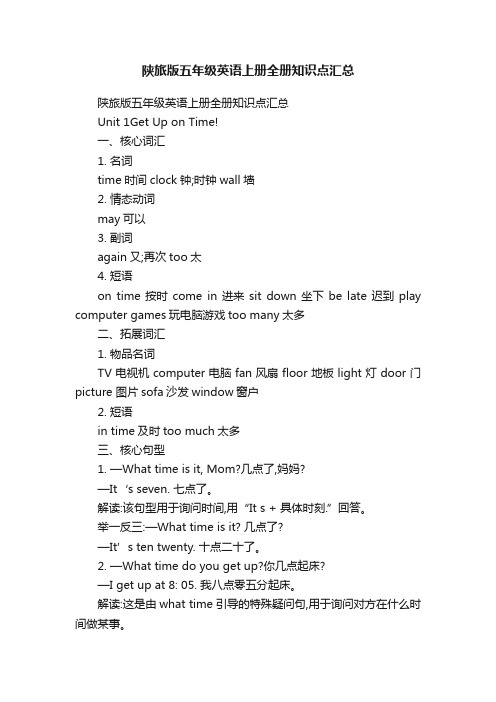
陕旅版五年级英语上册全册知识点汇总陕旅版五年级英语上册全册知识点汇总Unit 1Get Up on Time!一、核心词汇1. 名词time时间clock钟;时钟wall墙2. 情态动词may可以3. 副词again又;再次too太4. 短语on time按时come in进来sit down坐下be late迟到play computer games玩电脑游戏too many太多二、拓展词汇1. 物品名词TV电视机computer电脑fan风扇floor地板light灯door门picture 图片sofa沙发window窗户2. 短语in time及时too much太多三、核心句型1. —What time is it, Mom?几点了,妈妈?—It‘s seven. 七点了。
解读:该句型用于询问时间,用“It s + 具体时刻.”回答。
举一反三:—What time is it? 几点了?—It’s ten twenty. 十点二十了。
2. —What time do you get up?你几点起床?—I get up at 8: 05. 我八点零五分起床。
解读:这是由what time引导的特殊疑问句,用于询问对方在什么时间做某事。
举一反三:—What time do you watch TV?你几点看电视?—I watch TV at 10:00. 我十点看电视。
四、了解句型Get up! 起床了!解读:该句是以动词原形开头的祈使句,祈使句是用于表达请求、命令或劝告等的句子。
举一反三:Go to bed early. 早点上床睡觉。
Unit 2Be Helpful at Home!一、核心词汇1. 动词sweep打扫;清理water给……浇水clean清扫;清洁2. 名词dish盘;餐具meal餐;饭clothes衣服3. 副词sure当然4. 短语make the bed整理床铺sweep the floor扫地do the dishes洗餐具water the flowers浇花clean the windows擦窗户cook the meal做饭wash the clothes 洗衣服二、拓展词汇1. 动词cut 切;割pass传递wash洗cook烹调dry擦干2. 短语of course当然clean the door擦门water the trees浇树dry the dishes 擦干餐具三、核心句型1. —Can you sweep the floor, dear?你能扫地吗,亲爱的?—Yes, of course. 是的,当然。
小学五年级上册英语(陕旅版)知识清单

Unit 1Get Up on Time!一、核心词汇1. 名词time时间clock钟;时钟wall墙2. 情态动词may可以3. 副词again又;再次too太4. 短语on time按时come in进来sit down坐下be late迟到play computer games玩电脑游戏too many太多二、拓展词汇1. 物品名词TV电视机computer电脑fan风扇floor地板light灯door门picture图片sofa沙发window窗户2. 短语in time及时too much太多三、核心句型1. — What time is it, Mom?几点了,妈妈?— It‘s seven. 七点了。
解读:该句型用于询问时间,用“It s + 具体时刻.”回答。
举一反三:— What time is it? 几点了?— It’s ten twenty. 十点二十了。
2. — What time do you get up?你几点起床?— I get up at 8: 05. 我八点零五分起床。
解读:这是由what time引导的特殊疑问句,用于询问对方在什么时间做某事。
举一反三:— What time do you watch TV?你几点看电视?— I watch TV at 10:00. 我十点看电视。
四、了解句型Get up! 起床了!解读:该句是以动词原形开头的祈使句,祈使句是用于表达请求、命令或劝告等的句子。
举一反三:Go to bed early. 早点上床睡觉。
Unit 2Be Helpful at Home!一、核心词汇1. 动词sweep打扫;清理water给……浇水clean清扫;清洁2. 名词dish盘;餐具meal餐;饭clothes衣服3. 副词sure当然4. 短语make the bed整理床铺sweep the floor扫地do the dishes洗餐具water the flowers 浇花clean the windows擦窗户cook the meal做饭wash the clothes洗衣服二、拓展词汇1. 动词cut 切;割pass传递wash洗cook烹调dry擦干2. 短语of course当然clean the door擦门water the trees浇树dry the dishes 擦干餐具三、核心句型1. — Can you sweep the floor, dear?你能扫地吗,亲爱的?— Yes, of course. 是的,当然。
陕旅版五年级英语易错题复习(上)

一、单项选择。
(26分)( )1. We have______classes.A.notB.noC.any( )2.They ______really nice!A.looksB.lookingC.look( )3.I like the ______in spring.A.seasonB.weatherC.year( )4.He______summer very much.A.doB.likeC.likes( )5.There are ______months in a season.A.thereB.fourC.twelve( )6.What do you want ______your birthday?A.fprB.ofC.to( )7. ______the light we can play.A.AtB.OnC.In( )8. ______you interested in English?A.WereB.AreC.Is( )9. Yesterday_____my month's birthday.A.wereB.areC.is( )10. You_____born on May 1st.A.wereB.areC.is( )11.A: _____do you like spring?B:I can fly a kite and go climbing.A.WhenB.WhatC.Why( )12.A: What are you doing?B:_____A.I swim.B.I'm swim.C.I'm swimming.( )13._____is your birthday?A.WhenB.HowC.Where( )14._____you live?A.WhenB.HowC.Where( )15._____are you?A.WhenB.HowC.Where( )16.May I play the_____?A.fluteB.guitarC.drum( )17.A:____________________ B:Certainly.A.May I go out to play?B.What can you do?C.What can she do?( )18.A: Woud you please sing a song? B:_________________.A.Yes,I do.B.All right.C.No,I can't.( )19.A: How are you going there? B:_________________.A.By train.B.An airport.C.A bus.( )20.A: Where are you going now? B:_________________.A.By taxi.B.The airport.C.A bus.( )19.Yesterday my mother's birthday.A.isB.wasC.am( )20.A:Are you going there by train? B:_________________.A.Yes,it is..B.No,by taxi.C.A bus stop.( )21.October in winter.A.isB.is'tC.are( )22.Daming ofen aplles in autumn.A.pickB.pickingC.picks( )23.Let's a Chinese Knot.A.makesB.makingC.make( )24.I in Beijing last year..A.isB.wasC.am( )25.Xi'an is the west of China.A.atB.onC.in( )26.The snow fell trees.A.atB.onC.in二、找出错误并改正。
五年级上册英语 Unit 10 The Spring Festival is coming! 湘鲁版

Lily: Hello, Mr Wang. My name is Lily. I’m a TV reporter. I want to know about your Chinese Newd: Hello. The Spring Festival is coming. We’ re cooking and cleaning!
Our festival is the Happy Kids
Festival.
People usually gives gifts to kids and sing songs. People
usually eat …
>>Summary
如何询问和描述正在进行什么活动? — What are you doing? — I’m making Chinese paper-cuts.
>>Presentation
3. What is her grandma doing?
这里的引号表示特殊含义需要强调,指聋哑青年与其他观鱼人不同,爱鱼画鱼到痴迷的地步。
She is making Chinese paper-cuts. 2.文言文阅读
有这样一则故事,小溪问母亲怎样才能成为瀑布。母亲说,当你到达悬崖的尽头就会明白。小溪告别了母亲,在山间匍匐前行。历尽 艰辛,小溪终于攀上悬崖,奋力向前一扑,生命终于放出了异彩。 3、引导学生把自己最敬佩的人的名字写在黑板上,说一说他们身上值得学习的是什么风范。 E、学习词语应坚持“长流水,不断线”,根据自己情况,每天都要学习和积累一定的词语,到一定时期,特别是阶段性考试之后,将还 不熟悉的词语用过筛子的方法挑出来,再次复习,直至越来越少。
Let’ s learn
cook dinner
陕旅版五年级英语上册知识点汇总
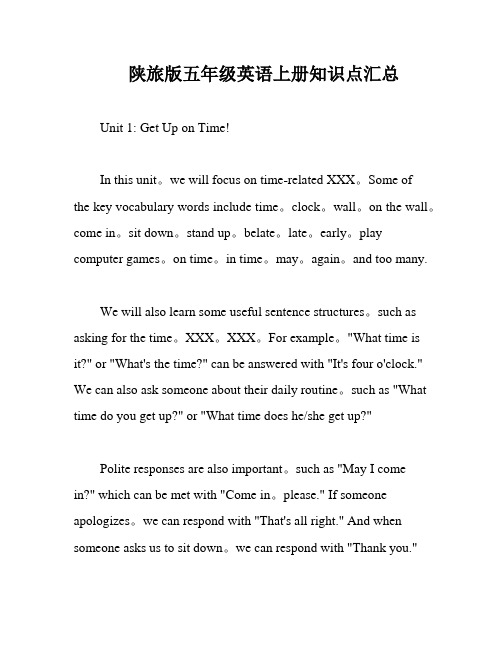
陕旅版五年级英语上册知识点汇总Unit 1: Get Up on Time!In this unit。
we will focus on time-related XXX。
Some ofthe key vocabulary words include time。
clock。
wall。
on the wall。
come in。
sit down。
stand up。
belate。
late。
early。
play computer games。
on time。
in time。
may。
again。
and too many.We will also learn some useful sentence structures。
such as asking for the time。
XXX。
XXX。
For example。
"What time is it?" or "What's the time?" can be answered with "It's four o'clock." We can also ask someone about their daily routine。
such as "What time do you get up?" or "What time does he/she get up?"Polite responses are also important。
such as "May I come in?" which can be met with "Come in。
please." If someone apologizes。
we can respond with "That's all right." And when someone asks us to sit down。
陕旅版五年级上册英语期重点句型

陕旅版五年级上学期英语句型Unit1 Get up on time!(按时起床!)1.、What time is it?(几点了?)It’s seven o’clock.(七点了。
)2、 May I come in?(我能进来吗?)Come in, please.(请进。
)3、Look at the clock on the wall.(看墙上的钟。
)4、 I’m sorry.(对不起。
) That’s all right.(没关系。
)5、What time do you get up?(你几点起床?)I get up at 8:05.(我八点过五分起床。
)6、What time do you go to bed?(你几点睡觉?)I go to bed at 11:15.(我十一点十五分睡觉。
)7、 What time does she go to school?(她几点去学校?)She goes to school at eight o’clock.(她八点去学校。
)8、 What time does he go to work?(他几点去上班?)He goes to work at eight twenty.(他八点二十去上班。
)Unit2 Be helpful at home!(在家多帮忙!)1、Can I help you?(我能帮你吗?)Sure.(那当然。
)2、 Can you sweep the floor? (你能扫地吗?) Yes, of course. (是的,那当然。
)3、 Can you water the flowers? (你能浇花吗?) OK. (好的。
)4、 What can you do at home?(在家你能做什么?) I can make the bed. (我能整理床铺。
)5、 Can you help me cook the meal?(你能帮我做饭吗?) Let me try.(让我试一试吧。
五年级英语上册 Lesson 10 第三课时教案 陕旅版

1、听课文录音并读熟对话。
2、做《活动手册》第III,第V题。
板
书
设
计
教
学
反
思
(2)出示“看电视”图片,让学生做看电视的动作,教授Watch Tv. T:What do you want to do after dinner? S: I want to watch Tv. T: What do you want to watch? S: I want to watch Channel 2.
3、看课本第46页图,回答下列问题:
(1)Where are they?
(2)Who are they?
(3)What are they doing?
4、听录音,让学生随着录音节奏学说。
5、跟读对话。
6、分角色朗读课文。
三、巩固练习:
做《活动手册》第I题。
录音内容:turn on, have a match, Channel 5.
(3)老师在黑板上画一个电视,做开、关电视的动作,重复turn on, turn off, 让学生试着说:turn on the Tv, turn off the Tv.
(4)老师根据图片出示:a match ,让学生猜它的意思。
(5)放录音,学生听读单词。
(6)同桌拿出单词卡片,互相出示卡片读单词并说意思。
B:Certainly . Go ahead!
C:Turn to Channel 8!
D: I want to watch Channel 5 .
重点难点
掌握本课所要求单词、短语及词汇。
教学准备
多媒体课件
教
学
过
程
一、复习引入
陕旅版五年级英语上册句型词汇知识点总结

Unit 1 Get up on time!词形:1.what time=when 什么时候e in 进来3.sit down 坐下4.be late 迟到5.play computer games 玩电脑游戏6.That’s all right没关系7.I see 我明白了我知道了8.draw pictures 画画9.go to work 上班10.do exercise 做运动11.have breakfast 吃早餐12.again 再次13.have(单三)has14.watch(单三)watches15.go(单三)goes16.early 早(反义词)late迟句型1.what time do you get up?你几点起床?I get up at eight.(我八点起床)时间点前用at2.what do you do at seven?你七点干什么?3.What time is it? = What’s the time?几点了4.May I come in? 我可以进来吗?May I sit down? 我可以坐下吗?MayI +动词原形….?5.Look at the clock on the wall.看墙上的钟表e in, please!(请进)这是一个祈使句,祈使句一般以动词原形开头,否定形式是在句首加Don’t7.You are late again.(你又迟到了)8.Don’t play too many computer games and go to bed early(不要玩太多的电脑游戏睡早点)9.What time does he/she/your father go to work?Unit 2 Be Helpful at home!词形1.make the bed(整理床铺)2.sweep the floor(扫地)3.do the dishes(洗碗)4.water the flowers(浇花)5.clean the windows(擦窗户)6.cook the meal/cook meals(做饭)7.wash the clothes (洗衣服)8.have dinner (吃晚餐)9.cross the street (过马路)10.after work (下班后)after class(放学后)after school (放学后)11.of course = sure 当然12.help(形容词)helpful13.at home = in one’s home在家14.let me try(让我试一试)15.every day (每天)16.this(反义词)that17.happy(副词)happily18.can(否定式)can’t19.dish(复数)dishes20.I (宾格)me21.on Sunday 在星期天句型1.Can I help you? 我能帮你吗?What can I do for you?我能为你做什么?2.Can you help me? 你能帮我吗?3.Can you sweep the floor?你能帮我扫地吗?Can you+动词原形…?4.You are helpful. He is helpful.5.Who cooks meal in your home? 在你的家里谁做饭?6.What can you do at home? What can he do at home?7.I often help my mother do the dishes.(我经常帮我妈妈洗碗)8.Can you help me cook the meal?(你能帮我做饭吗?)9.I/He/She can +动词原形情态动词跟动词原形Unit 3 My favorite food is hamburgers.词形1.my favorite/his favorite/her favorite/their favorite/its favorite…2.China (形容词)Chinese3.good(最高级)best4.in China(在中国)5.too同音词to two6.family(复数)families7.have(单三)has8.there(反义词)here9.be good at擅长10.good(副词well句型1.My favorite food is hamburgers. 我最喜欢的食物是汉堡包=I likehamburgers best.2.What food do you like?你喜欢什么食物3.What’s your favorite food食物/drink饮料/subject科目/color颜色…?同义句:What food/drink/subject…do you like best?4.What about you?=how about you?你呢?5.They’re delicious.它们很可口6.I like Chinese food, too.我也喜欢中国食物7.My family are having our afternoon tea.我的家人正在喝下午茶8.Mom is drinking coffee.妈妈正在和咖啡9.……is/are my favorite… ...是我的最爱10.He has a small shop.他有一家商店11.A women wants to buy some hamburgers.一位妇女想买一些汉堡12.She draws well.他画的很好Unit 4 At Table词形1.at table 用餐、吃饭at home 在家at school 在学校2.have breakfast/lunch/supper 吃早餐/午餐/晚餐3.left反义词right4.have(现在分词)having5.Chinese food中国美食6.can(否定式)can’t7.pass传递动词后跟宾格pass /give /help me pass him pass her8.cut(现在分词)cutting9.want(单三)wants10.happy副词happily11.knife(复数)knives12.want = would like want to = would like to 想要13.特殊疑问词总结:what(什么)where(哪里)when=what time(什么时候)Which(哪一个)who(谁)how(怎么样什么方式)句型e the fork with your left hand and use the knife with your right hand.(左手用叉,右手用刀左叉右刀)2.They are having noodles for lunch now. 他们正在吃的午餐是面条3.Not like that不是那样的4.I can’t use chopsticks well.我不能很好地使用筷子5.I want to have some soup.我想喝一些汤6.Would you please pass me the spoon? 句型would you+动词原形你愿意…你能不能7.Here you are给你8.Here are the chopsticks.筷子在这呢9.Pass me the knife, please请把刀子递给我此句话是祈使句祈使句的否定式是在句首加don’t Don’t pass me the knife.10.May I….? Can I…? Can you …? Would you….?Unit 5 Can you tell me the way to thesupermarket?词形1.take a bus 乘坐公共汽车2.Children’s Park 儿童公园3.get off the bus下车4.the way to… 去…的路5.go along… 沿着…的路6.get to 到达7.on the left 在左边on the right 在右边8.in the sofa 在沙发上9.child (复数)children10.I’d like = I would like11.How about…?=What about …?12.You’re welcome. 不客气13.beside 在..旁边behind 在…后面between 在…之间14.bookstore书店bus stop公共汽车站cinema 电影院句型1.Can you tell me the way to the supermarket?你能告诉我去超市的路吗?同义句How can I get to the supermarket? 我怎么能到达超市?2.There is a cinema near here.一般疑问句Is there a cinema near here?3.Go along …(…路)and you can see…(建筑物)4.You can take a bus at the bus stop and get off at the Park Road. 你可以在公交车站乘坐公共汽车,在公园路下车5.The Children’s Park is beside it. 儿童公园在它旁边6.There is a shop between the school and the park. 在学校和公园之间有一家商店7.Where is … ? …在哪里?Unit 6 How Much Is It?词形1.look(单三)looks2.that对应词this that复数these this 复数those those对应词these3.small反义词big4.we’ll=we will5.they宾格them they形容词性物主代词their6.pair复数pairs7.be going to 打算8.which one 哪一个she宾格her she形容词物主代词her句型1.It looks good. 它看起来很好They look good.他们看起来很好2.How much is it?单How much are they?复3.I would like (to buy) two pairs of socks.我想要两双袜子4.They look / It looks too big for her/for him/for me.5.Would you like to + 动词原形?Would you like + 名词?6.We’ll buy it/them. = We’ll take it/them. buy=take 买7.She is going to buy three pairs of trousers.8.Which one do you like? 你喜欢哪一个?9.Do you mean this one? 你的意思是这一个吗?Unit 7 She looks tall and thin.词形1.know 同音词no2.sport 复数sports3.friend 复数friendse 单三comes5.after class 下课后after school 放学后6.speak 单三speaks7.China(形容词)Chinese8.family复数families9.tall高/ long长(反义词)short矮/短10.woman(女人)对应词man(男人)11.thin胖反义词fat瘦12.woman 复数women13.man复数men14.aunt 对应词uncle15.white白反义词black黑16.old 老/旧反义词young 年轻new新17.in red 穿红色衣服in that red dress 穿那件红裙子的18.they形容词性物主代词their19.be good at+名词be good at + 动词ing 擅长句型1.Do you know the girl? 你知道那个女孩吗?2.She looks tall and thin.她看起来又高又瘦3.My/Her/His name is … 我的/她的/他的名字叫….4.She comes from + 国家名5.She speaks English. 她讲英语She can speak a little Chinese.她会将一点点汉语6.She likes sports. 她喜欢运动7.She can run very fast.她可以跑的很快。
陕旅版五年级上册英语每单元重点句型和短语
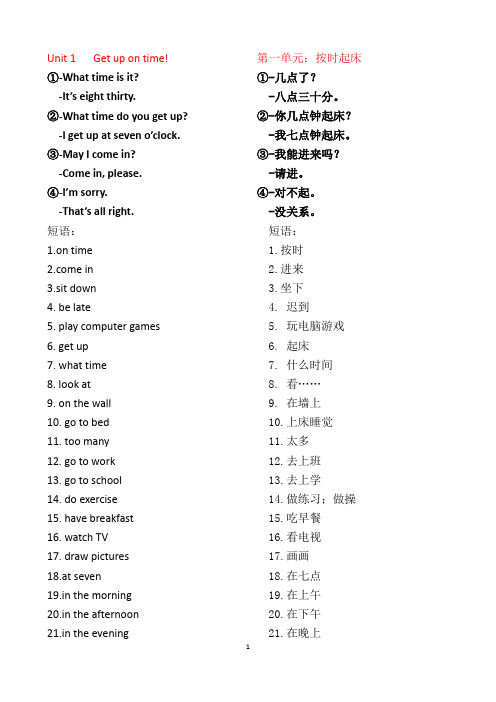
Unit 1 Get up on time!①-What time is it?-It’s eight thirty.②-What time do you get up? -I get up at seven o’clock.③-May I come in?-Come in, please.④-I’m sorry.-That’s all right.短语:1.on timee in3.sit down4. be late5. play computer games6. get up7. what time8. look at9. on the wall10. go to bed11. too many12. go to work13. go to school14. do exercise15. have breakfast16. watch TV17. draw pictures18.at seven19.in the morning20.in the afternoon21.in the evening 第一单元:按时起床①-几点了?-八点三十分。
②-你几点钟起床?-我七点钟起床。
③-我能进来吗?-请进。
④-对不起。
-没关系。
短语:1.按时2.进来3.坐下4. 迟到5. 玩电脑游戏6. 起床7. 什么时间8. 看……9. 在墙上10.上床睡觉11.太多12.去上班13.去上学14.做练习;做操15.吃早餐16.看电视17.画画18.在七点19.在上午20.在下午21.在晚上Unit 2 Be helpful at home!①-Can you…?-Yes, of course./OK./Sure.②-What can I do for you?③-Can I help you?- Sure.④You are helpful.⑤I often help my mother do the dishes.⑥Let me try.短语:1.cook meals2. in your home3. at home4. make the bed5.sweep the floor6. do the dishes7. water the flowers8. clean the windows9. cook the meal10. wash the clothes11. of course12. have dinner13.clean the blackboard14. cross the street15. in my family16. from Monday to Friday17. after work18. clean the table19. on Sunday20. be helpful 第二单元在家帮忙!①-你能……吗?-当然可以。
陕旅版英语五年级下Lesson 10 I want to watch Channel 5导学案

Lesson 10 I want to watch Channel 5课时:第一课时一、学习目标:1、熟练掌握“四会”单词及短语:turn on ,turn off , Channel 5 ,a match.2、能熟练并正确灵活运用句型I want to…?会用此句型表达自己的意愿。
二、学习重难点:1、熟练掌握“四会”单词及短语:turn on ,turn off , Channel 5 ,a match.2、能熟练并正确灵活运用句型I want to…?及答语三、学习过程:(一)、检查预习(6分钟)根据老师的汉语提示,写出相应的单词或短语。
1、打开(电源,开关)____2、关闭(电源,开关)_____3、5频道_____4、一场比赛_____(二)、出示目标(2分钟)一、学习目标:1、熟练掌握“四会”单词及短语:turn on ,turn off , Channel 5 ,a match.2、能熟练并正确灵活运用句型I want to…?会用此句型表达自己的意愿。
(三)、单词朗读及记忆。
(8分钟)1、学生根据自己的知识积累朗读单词turn on ,turn off ,并知道它们是一对反义词。
能够尝试运用。
2、出示图片,理解Channel的意思,并会用此单词了解频道的表达。
如:6频道-----Channel 63、自学并记忆单词match.(四)、拓展延伸:(6分钟)1、老师给出示范,给出拓展要求:让学生用所学单词用I want to…?说话2、两人一组,练习说话。
3、交流展示。
(16分钟)四、预习作业:(2分钟)1、熟读对话,在对话中理解turn to Channel 8 ./a TV play/ Go ahead 的意思。
2、在对话中找出句型May I …?Lesson 10 I want to watch Channel 5课时:第二课时周次:第十三周一、学习目标:1、熟读对话,学习并掌握句型May I …?及答语。
陕旅版小学英语五年级上册单元知识点归纳

陕旅版小学英语五年级上册单元知识点归纳知识点汇总单词clock 闹钟 wall 墙 again 又、再次 come in 进来 Sitdown 坐下 be late 迟到 play computer games 玩电脑游戏 too many 太多 on time 按时句型1 -What time do you get up/go to school/ go to bed/go to work? 你几点起床/上学/上床睡觉/去上班?-I get up/go to school/ go to bed at ......我…点起床/上学/上床睡觉.2、What do you do at four o’clock ? 你在四点钟做什么?3-What time is it? 几点了? -It`s seven.7点。
4-Don`t play too many computer games and go to bed early.不要玩太多电脑游戏,早点睡觉。
May i come in? -Come in ,please我可以进来吗?——请进。
6.Look at the clock on the wall.(看墙上的闹钟)7.You are late again.(你又迟到了)Unit 2知识点汇总单词make the bed 整理床铺 sweep the floor 打扫 do the dishes 洗餐具 water the flowers浇花 clean the windows擦窗户 cook the meal 做饭 wash the clothes 洗衣服 sure 当然句型1.—Can I help you,grandma? 我可以帮你吗,奶奶?—Sure. 当然。
2.Can you water the flowers/ sweep the floor/do the dishes?你会浇花/扫地/洗餐具吗?—Yes,of course/sure.3.—What can you/he/she do at home?.你/他/她在家会做什么?—I/He/She can make the bed.我/他/她会整理床铺。
- 1、下载文档前请自行甄别文档内容的完整性,平台不提供额外的编辑、内容补充、找答案等附加服务。
- 2、"仅部分预览"的文档,不可在线预览部分如存在完整性等问题,可反馈申请退款(可完整预览的文档不适用该条件!)。
- 3、如文档侵犯您的权益,请联系客服反馈,我们会尽快为您处理(人工客服工作时间:9:00-18:30)。
一、教学背景:1.面向主体:小学五年级学生2.学科:英语3.课时:2课时4.课前准备:PPT课件,电视机,单词卡片,手电筒,文具盒二、教学课题:《Lesson 10 I want to watch Channel 5.》1.三维目标:(1)知识目标:①能听、说、认、读、写下列单词和短语:channel, TV play, match, turn on, turn off②能听懂、会说、会用、会写下列句型:May I turn on the TV, please?Certainly. Go ahead.Turn to channel 8.I want to watch channel 5.(2)能力目标:提高学生听、说、读、写等综合能力。
(3)德育目标:通过要学生了解广州亚运会的相关知识,向运动员们学习,培养学生的爱国意识,奋发进取的精神。
(4)情感态度与价值观:①.通过guess, game等学生喜欢的活动,培养学生的兴趣。
②.通过任务培养学生乐于与他人交流合作的态度。
(5)学习策略主动与伙伴交流合作,共同完成学习任务。
2.教学重点:听懂、会说、会用、会写下列句型:(1)May I______ ,please ?(watch Channel 5 , turn on the TV,tu rn off the TV ,go out to play ……)(2)Certainly. Go ahead.3.教学难点:掌握本课的单词、短语,会用“May I……”的句型表达自己的意愿,并能在实际生活中灵活运用。
三、教材分析;本文是陕西旅游版教材第五册第十课。
这篇课文就是Li Dong、Li Shan 和爸爸三个人谈论电视节目及电视频道的话题。
本节课是第十课的其中一个重点,主要是让学生学会谈论电视节目和电视频道及表达自己的意愿。
新课标明确指出:基础教育阶段英语课程的任务是,激发和培养学生学习英语的兴趣,使学生树立自信心,养成良好的学习习惯和形成有效的学习策略,发展自主学习的能力和合作精神。
基于这一理念,我设计了不同形式的活动,活跃课堂气氛,激发学生兴趣,让学生在感受,体验,参与、合作过程中来学习语言,感受用英语交流的乐趣,培养学生初步用英语交流的能力。
四、教学方法单词接龙、TPR,说说- 演演,游戏教学法五、教学环境和资源准备1、教学环境:多媒体教室2、资源准备:教学Powerpiont课件六、教学过程:Step1. 热身(Warming up)可以通过自我介绍让学生了解自己,增加学生对自己的信任度,带领学生喊一些具有激励作用的口号,增强他们的自信心。
然后指名学生介绍他(她)自己,并回答教师提出的问题。
(T:Teacher老师 S:Student 学生)T: What’s the date, ?S: It’s November 23rd.T:How is the weather today?S:It’s sunny.T:Do you like watch TV?S:Yes,I do.T:What do you want to watch?(一般你都喜欢看什么节目呢?)S:动画片(卡通),电视剧,体育节目……T: 最近几天我国正在举办广州亚运会,很多频道都在转播赛事,不知道同学们有没有人关注呀?这是全国瞩目的盛会,希望同学们也可以多看看相关节目,看看那些运动健儿们是如何为祖国争光添彩的,学学他们奋勇拼搏的精神,希望你们长大后也可以让祖国为有你们而骄傲。
Step2. 新课展示(New Presentation)T:今天我们就来学习一篇跟看电视有关的课文。
Today, we will learn “Lesson 10 I want to watch Channel 5.”(一)词汇学习:T :学单词之前老师做几个动作,大家来猜一猜我在干什么?用多媒体课件出示四张新单词的图片:turn on ,turn off , Channel 5 , a match,然后分别讲解。
强调:Channel首字母必须大写,小写的 channel是水渠。
(二)课文以及句型学习:用幻灯片出示课文内容和录音,要求学生仔细听并思考,教师适时的讲解疑难词汇:TV play , tonight.1)New words:a.出示词卡,拼读拼写单词 :a TV play 电视剧Do you like to watch TV play?b.出示词卡,拼读拼写单词 : Channel 5 Channel 8 频道Chan-nel channel 是个双音节词,按音节很好记。
c.出示词卡,拼读拼写单词 : match 比赛,尤其指各类球类比赛。
说说这些短语和句子:Football match basketball match volleyball match watch a match2) Language points:● May I…?是生活中常用的表示请求的句子,翻译成“我可以……吗?”。
它的后面直接跟动词原形。
eg: May I come in, Miss Zhang?May I sit down?May I use your telephone, Liu Mei?几种答语:Certainly. Yes,of course. 都表示说话人完全赞同。
意为当然可以。
Go ahead. 好的,去吧。
也表示同意。
Sorry.I’m afraid not.对不起,恐怕不行。
是一种委婉的拒绝。
No.You’d better not.不,你最好不要。
是一种较为强硬的拒绝。
●turn on turn off turn to三个词组的比较。
turn on打开,通过开关打开电器之类的东西。
eg: turn on the light /TV/radioturn off关掉,通过开关关掉电器之类的东西。
eg: turn off the light /TV/radioturn to…翻倒,转到…eg: turn to page 46 翻到46页。
turn to Channel 8 转到8频道。
当我想让别人面朝我时,还可以说turn to me(转向我).Step3.巩固练习(Practise.)1)Play a game (Listen and do).用游戏巩固刚刚比较的几个短语:请一组同学上前准备听指令做事,选另一组同学从第一个开始一个一个发指令,指令: turn on … turn off… turn to…指令可以用教室里的电视机,灯,桌子上的书,文具盒等。
指令要求不能重复。
全班其他同学当裁判,指令重复的扣一分,听指令做错的每人次扣一分,看哪一组最后获胜。
2)练习用“May I……”的句型表达自己的意愿。
出示八幅图片让同学们练习用上面给出的词组来做简单的对话,练习“May I……”的句型。
Step4.作业安排(Homework)1)Do a survey. Do you know? 做这个调查活动不但能增加趣味性,还能拓展学生的视野。
让学生通过讨论知道答案,让学生回家去打开电视看一看,自己找出答案。
What is on Channel 8 ? (TV play)What is on Channel 5 ? (Sports )What is on Channel 6 ? (Movie)What is on Channel 1 ? (News ,performance amd TV play)What is on Channel 10 ? (Science and education)Which channel do you like best?On which channel can you watch cartoon ?(Channel 14)2)抄写单词;背诵课文。
七、教学反思:因为是借班上课,我担心课堂上师生之间的陌生感太强会影响教学的正常开展,所以Warming-up环节我安排了和学生进行 talk free.我首先向学生做了自我介绍,拉近与学生之间距离。
然后引导学生喊激励性的口号“I believe I can ,I am the best. We are really wonderful!”用以调动他们的热情,增强他们的自信心。
这一环节达到了预期的目的,学生们激情高涨,向我展示了他们的友善。
接下来我按原计划请人来配合我的提问,可是没有一个学生举手,我想这其中应该有两个原因:一、我们初次打交道,彼此不熟悉,学生摸不透老师的脾气不太配合;二、高年级的学生不像低年级的学生那样表现欲强,积极参与课堂活动,他们好像是被动的,老师叫到了就主动参与,没叫到就不发言。
因为课前考虑到了会出现这种情况,所以我没有因为这种情况慌神,仍然面带微笑请了两位同学回答我提出的问题,并在提问中有意识的引导其他同学共同回答。
从同学们的回答中我发现这个班学生的英语水平比我预想的还要差,很多同学的发音都存在着或多或少的问题。
所以在后面的单词教学中我强调了单词的发音位置,并进行强化训练。
我在教学中比较重视德育的渗透,在与学生的 Talk free 里我设计了“Do you like to watch TV?”这一问题,询问他们爱看的节目,引到了最近的广州亚运会,让学生们关注这方面的信息,希望提高他们的民族自豪感,学习运动员们奋勇拼搏的精神,再由这一内容自然引出新课。
New Presentation(新课展示)部分,我设计的也比较有新意。
我借用了文具盒、镜子这些道具,通过动作演示让学生Guess我想表达的含义。
学生猜出来后,我又说“If you want to watch TV,you must……”,让学生自己说需要干什么。
学生们用汉语说出“打开电视”后,我问“那你们想不想知道用英语怎么表达开电视呀?”这样的方式既轻松有趣,又激起了学生的求知欲,引起了他们的注意。
在出示词组后我又让学生们将打开电视完整的表述出来,学生们表述的不是很完整“Turn on TV”,我让他们自己判断正误以后强调TV是专有名词前面要加定冠词the 。
在教学Channel时,我在黑板上板书China和china,让他们判断二者是否相同,然后告诉他们, China表示中国,而china表示瓷器,单词的大小也是必须要注意的,并强调Channel表示频道,channel表示水渠。
教这些单词时我还准备了单词卡,在读这一环节之后又让学生伸出手指当作笔在桌上或空中边读边画,手眼脑并用,然后遮住单词考考学生的识记情况。
我安排的第一课时是着重解决单词问题和重点句型,在听完录音后我要求学生平时要多听英语磁带,注意朗诵者的发音,强调美式发音和我们平时发音中的不同之处。
然后出示课文中需要掌握的重点句型“May I……”和它的答语。
